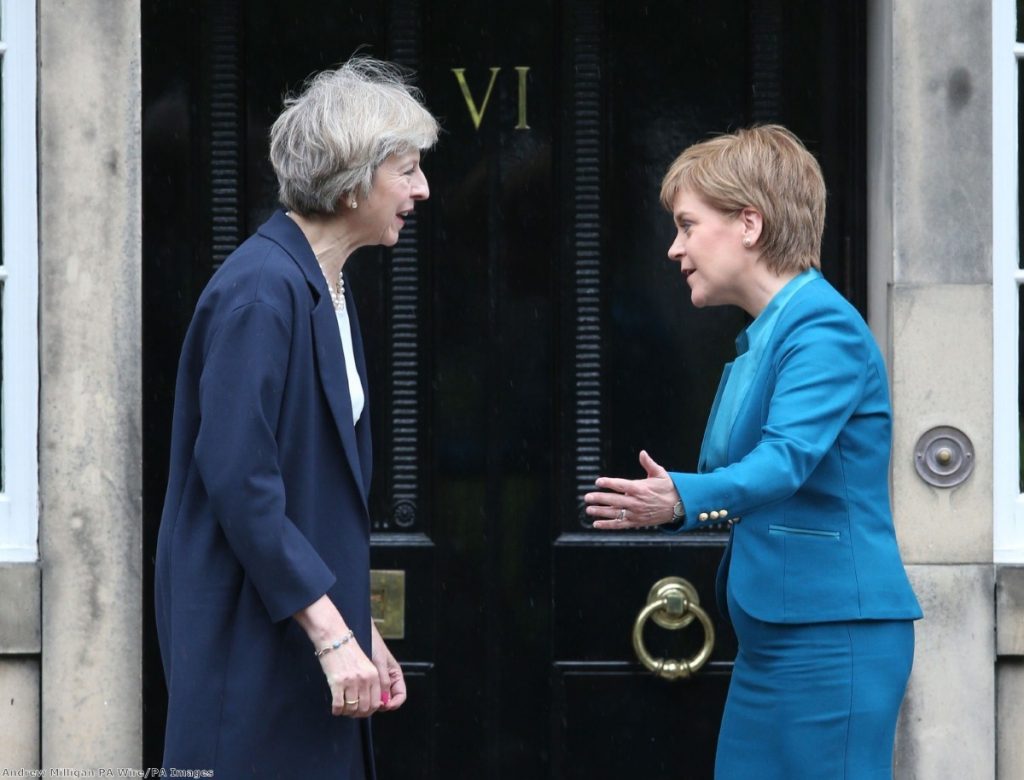The only way Theresa May could be more useful to Nicola Sturgeon is if she constructed a set of strings, attached them to her limbs and handed them to the Scottish first minister so she could use her as a nationalist puppet. The prime minister emerged today, in a toe-curlingly robotic and under-rehearsed broadcast interview, to tell Scotland that "now is not the time" for a second referendum.
She used that phrase five times. When was the time then? she was asked. "Now is not the time," she replied. Do you mean while you are prime minister, or before the next election, or just until after Brexit? "Now is not the time," she replied.
May's team are sensible enough to know that they cannot realistically block the referendum taking place. The most they can do is block the timing. It's not a matter of law or constitution. It's purely political. Telling Scotland whether it can hold a referendum plays into all the SNP's narratives about bullying, arrogant London.
But May neither blocked nor didn’t block. She found a land called 'the worst of all worlds' and planted her flag on it. She's prepared to allow Scotland to hold the referendum –that's implicit by the focus on timing – but be seen to block it until it finally takes place.


So first she stokes the sense of grievance and then she gives it an outlet.
To be fair, she had few options open to her. It's absurd to pretend the British government can handle this while simultaneously dealing with the climax of Brexit negotiations. But then, that is exactly what Sturgeon wanted. She timed this to put May in this position and now May has done exactly what she wanted.
Since the Brexit vote, the prime minister has worked tirelessly to conform to the SNP stereotype of Westminster. They ignored Scottish wishes and decided to pull Britain out the single market. They dismissed SNP efforts to find a way for Scotland to stay in. They failed to give them a meaningful role in the great repeal bill overhaul of British law. They threatened to block the devolution of agriculture and fisheries from Brussels to Edinburgh. Sturgeon may as well have written out the script, sent it to May, and have her follow it word for word.

Now May is doing all the SNP's PR work by blocking the referendum, but she hasn't even decided on a date for when one should be held. When her team were stress-testing today's statement, as they presumably did, did none of them ask: "So if not now, then when?" It seems perfectly obvious that any journalist would immediately ask this question given how vague May's statement was, and yet she had no answer for it, even four days after Sturgeon's speech. The first minister has well and truly checkmated No.10.
This isn't just about Scotland, it's also about Article 50. May is now open to having the Scottish issue used as leverage against her throughout the process. Every time she is stubborn over something, the EU can simply turn around and go: OK, we'll hold a chummy press conference with Sturgeon about fast-track membership. In an already disadvantageous negotiating position, this is another stick to beat Westminster with.

And then there is the way it rhetorically undercuts May's position. As you can see from that interview, her every argument for the British Union undermines her arguments against the European Union. "It wouldn't be fair to the people of Scotland" for them to vote on independence "without knowing what the future partnership would be ". This is almost comically ironic, given it is exactly what Brits were asked to do during the Brexit campaign. "We should be working together, not pulling apart," she went on, seemingly with a straight face. She must at some level realise how absurd this all sounds.
I suspect Sturgeon didn't even intend to try and hold the referendum in her designated time period of between autumn 2018 and spring 2019 (after the Brexit deal, if it can be arrived at, but before we leave). The SNP seem pretty happy with the idea of just joining the European Free Trade Association (Efta) and through that the single market via the European Economic Area (EEA). It means they can sidestep the awkward question of Spain's veto. And even after Brexit, it rids them of any need to join the Eurozone or Schengen.
Instead, they have a nice club of small countries to join, one in which they can take a leadership role alongside Norway instead of being a plaything of London and Brussels. It also means they can tell UK-companies to up sticks to Scotland if they want access to the single market. That isn't a proper economic strategy but it is the start of one and it projects an image of aspiration and progress at a time when Britain is likely to be suffering the hard economic effects of Brexit and possibly even the catastrophic one of having no deal at all. Joining Efta even compliments Alex Salmond's dreams of an 'arc of prosperity' in northern Europe.
Sturgeon is getting everything she wants. And May is giving it to her.
Ian Dunt is the editor of Politics.co.uk. His book – Brexit: What The Hell Happens Now? – is available now from Canbury Press.
The opinions in politics.co.uk's Comment and Analysis section are those of the author and are no reflection of the views of the website or its owners.









